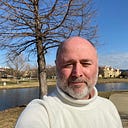I like this piece. It's validates a true issue, one I frequently encounter as a clinician. And you're spot on- men are susceptible.
It likely hints at a social cultural phenomena that needs to be addressed, because in validating this is true, it also emphasizes that the opposite of beauty is equally problematic. There are studies that consistently demonstrate people with higher symmetry and or tallness get promoted over less symmetrical and less tall, even when the opposite of perceived beauty demonstrates greater competence.
Both people- high in perceived beauty, and the opposite, have equal, and higher, rates of reported loneliness and isolation- than say perceived 'average.' And yet, there is clearly this 'wanting' of from those that fall into the perceived 'average' wanting to be more ideal. All people need to have emotional and intellectual reciprocity of interaction, but surface appearance frequently get in the way of true connection.
So, your question becomes how do we embrace who we are, when almost everything in society wants us to be something more... I will travel today pondering this mystery, knowing I will never fully know what it's been like for those on either side of the fence- beauty or opposite.
